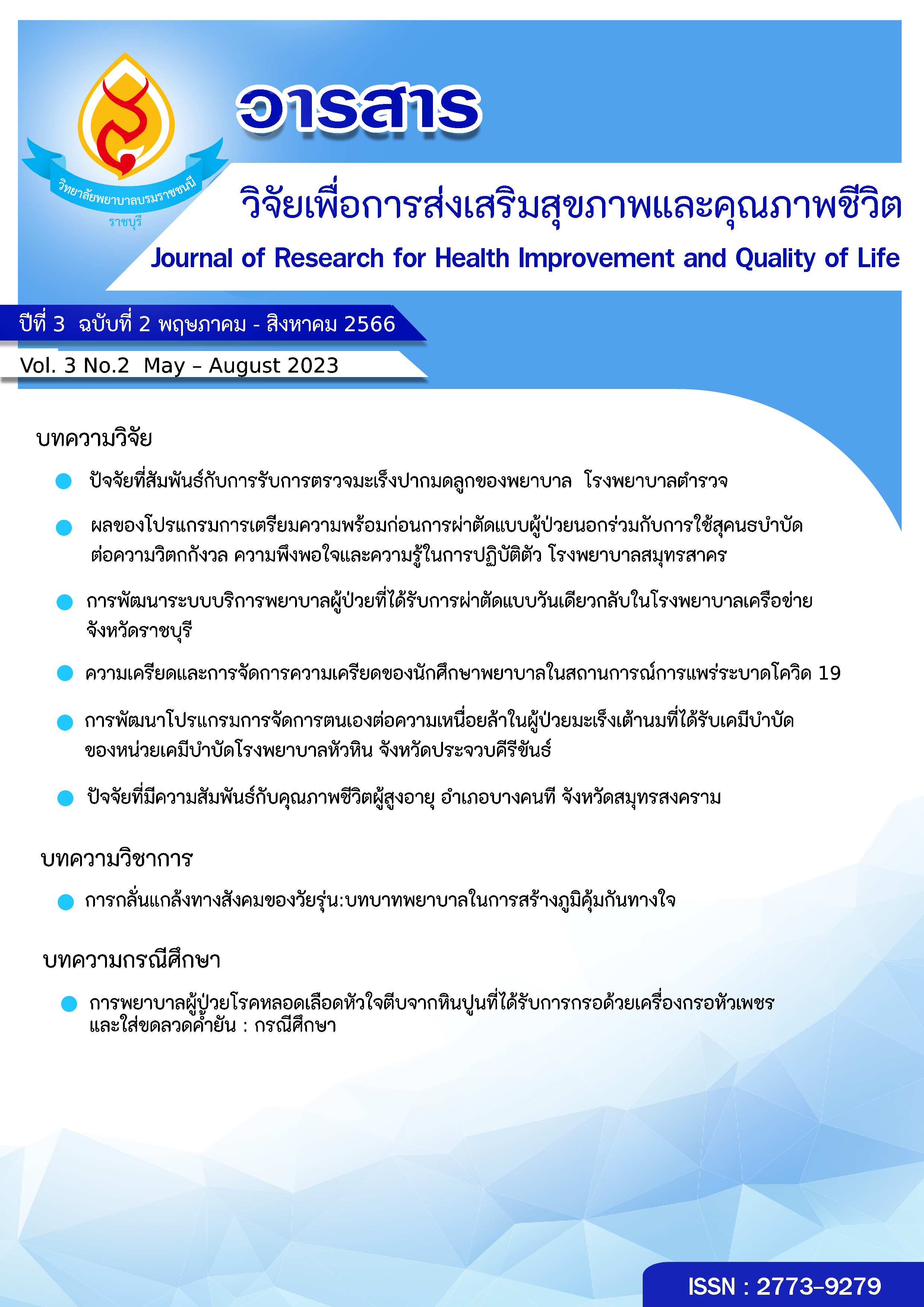การพัฒนาโปรแกรมการจัดการตนเองเพื่อลดอาการเหนื่อยล้าในผู้ป่วยมะเร็งเต้านมที่ได้รับเคมีบำบัดของหน่วยเคมีบำบัดโรงพยาบาลหัวหิน จังหวัดประจวบคีรีขันธ์
คำสำคัญ:
การจัดการตนเอง, ความเหนื่อยล้า, ผู้ป่วยมะเร็งเต้านม, เคมีบำบัดบทคัดย่อ
การวิจัยและพัฒนานี้มีวัตถุประสงค์เพื่อ 1) พัฒนาโปรแกรมการจัดการตนเองเพื่อลดความเหนื่อยล้าในผู้ป่วยมะเร็งเต้านมที่ได้รับเคมีบำบัด 2) ประเมินประสิทธิผลของโปรแกรมฯ กลุ่มตัวอย่าง คือ ได้แก่ ผู้ป่วยมะเร็งเต้านมหลังผ่าตัดเต้านมและได้รับเคมีบำบัด Cycle ที่ 2 เป็นต้นไป 78 คน แบ่งเป็นกลุ่มทดลองและเปรียบเทียบ กลุ่มละ 39 คน เครื่องมือวิจัย ได้แก่ โปรแกรมและแบบประเมินความเหนื่อยล้า ค่าความเที่ยง เท่ากับ 0.98 วิเคราะห์ข้อมูลด้วยสถิติพรรณนาและสถิติทดสอบที ผลการวิจัย พบว่า
1. ผลการวิเคราะห์สถานการณ์ พบว่า ผู้ป่วยมะเร็งเต้านมที่ได้รับเคมีบำบัด มีความอ่อนล้าแตกต่างกันตามระยะเวลาที่ได้รับแคมีบำบัด ถ้าพักผ่อนไม่เพียงพอจะทำให้เกิดการอ่อนล้ามากกว่าปกติ โปรแกรมการจัดการตนเองเพื่อลดการเหนื่อยล้า ประกอบด้วย การติดตามอาการตนเอง การประเมินตนเอง การปรับเปลี่ยนพฤติกรรมและการปฏิบัติตัว การเสริมแรงตนเอง และการใช้โลชั่นน้ำมันหอมระเหย
2. ผลการทดลองใช้โปรแกรมฯ พบว่าผู้ป่วยมะเร็งเต้านมกลุ่มทดลองมีความเหนื่อยล้าลดลง หลังได้รับโปรแกรมฯ และต่ำกว่ากลุ่มเปรียบเทียบอย่างมีนัยสำคัญทางสถิติที่ระดับ .05
ดังนั้นการดูแลผู้ป่วยมะเร็งเต้านมที่ได้รับเคมีบำบัดควรส่งเสริมความสามารถในการจัดการตนเองเพื่อลดความเหนื่อยล้าและผ่อนคลายความเครียด รวมทั้งให้ญาติมีส่วนร่วมในกระบวนการจัดการตนเองเพื่อเสริมแรงในการรักษาของผู้ป่วย
เอกสารอ้างอิง
Alizadeh, N., Packer, T., Chen, Y., & Alnasery, Y. (2023). What we know about fatigue self-management programs for people living with chronic conditions: A scoping review. Patient Education and Counseling, 114, 107866. https://doi.org/10.1016/j.pec.2023.107866
Amarsheda, S. B., & Bhise, A. R. (2021). Association of fatigue, quality of life and functional capacity in breast cancer patients receiving adjuvant chemotherapy. Asian Pacific Journal of Cancer Care,6(1), 59-64.
Brown, S. E., Shah, A., Czuber-Dochan, W., Bench, S., & Stayt, L. (2023). Non-pharmacological interventions for self-management of fatigue in adults: An umbrella review of potential interventions to support patients recovering from critical illness. Journal of Critical Care, 75, 154279. https://doi.org/10.1016/j.jcrc.2023.154279
Cheng, A. S., Liu, X., Ng, P. H., Kwok, C. T., Zeng, Y., & Feuerstein, M. (2020). Breast cancer application protocol: a ramdomised controlled trial to evaluate a self-management app for breast cancer survivors. BMJ open,10(7), e034655.
Cohen, J. (1992). Quantitative methods in psychology: A power primer. Psychol. Bull.,112, 1155-1159.
Courtier, N., Armes, J., Smith, A. (2022). Targeted self-management limits fatigue for women undergoing radiotherapy for early breast cancer: results from the ACTIVE randomised feasibility trial. Support Care Cancer 30, 389–400. https://doi.org/10.1007/s00520-021-06360-0
Faul, F., Erdfelder, E., Buchner, A., & Lang, A. G. (2009). Statistical power analyses using G*Power 3.1: Tests for correlation and regression analyses. Behavior Research Methods, 41(4), 1149-1160.
Hayee, F., Songwathana, P., & Petpichetchian, W. (2009). The effect of symptom management combining aromatherapy massage program on fatigue among HIV-infected persons. Songklanagarind Medical Journal, 27(4), 301-311. (in Thai)
Hersche, R., Roser, K., Weise, A., Michel, G., & Barbero, M. (2022). Fatigue self-management education in persons with disease-related fatigue: A comprehensive review of the effectiveness on fatigue and quality of life. Patient Education and Counseling, 105(6), 1362-1378.
Kanfer, F. H. & Gaelick-Buy, L. (1991). Self-management methods. Helping people change: A text of methods (305-360). Pergamon Press.
Kim, S., Xu, Y., Dore, K., Gewurtz, R., Larivière, N., & Letts, L. (2022). Fatigue self-management led by occupational therapists and/or physiotherapists for chronic conditions: A systematic review and meta-analysis. Chronic Illness,18(3), 441-457.
Kuakarn, J., Isaramalai,S., Baltip,Q.(2015). Impacts of a self-management programme for nutritional enhancement on the fatigue conditions of cancer patients undergoing radiotherapy. Thai Journal of Nursing Council, 30(2) 20-32 (in Thai)
Medeiros Torres, D., Jorge Koifman, R., & da Silva Santos, S. (2022). Impact on fatigue of different types of physical exercise during adjuvant chemotherapy and radiotherapy in breast cancer: systematic review and meta-analysis. Supportive Care in Cancer, 30(6), 4651-4662.
Melnyk, B. M., & Fineout-Overholt, E. (2022). Evidence-based practice in nursing & healthcare: A guide to best practice. Lippincott Williams & Wilkins.
Moghari, M., Rahemi, Z., Sadat, Z., Mirbagher Ajorpaz, N. (2022). Effects of aromatherapy using sour lemon on nausea in patients undergoing chemotherapy: A quasi-experimental study. Iranian Rehabilitation Journal, 20(2), 209-216.
Naraphong, W. (2023). Self-management energy conservation for cancer-related fatigue in Thai Women with breast cancer receiving chemotherapy: A pilot study. ONF 2023, 50(3), 337-347. DOI: 10.1188/23.ONF.337-347
O’Regan, P., & Hegarty, J. (2017). The importance of self-care for fatigue amongst patients undergoing chemotherapy for primary cancer. European Journal of Oncology Nursing, 28, 47-55.
Piper, B. F. (2003). Pathophysiological phenomena in nursing: Human Responses to illness. 3rd ed. St Louis: Saunders.
Polit, D. F. B & Beck, CT. (2014). Essentials of nursing research: Appraising evidence for nursing practice. London, Lippincott.
Reis, D., Throne, T., Keller, J., Koffel, C., Chen, T., & Young-McCaughan, S. (2022). Cancer-related fatigue: A pilot study evaluating the effect of frankincense essential oil in patients with cancer receiving chemotherapy. Cancer Nursing, 43(3), 207-2016.
Schmidt, F., Ribi, K., Haslbeck, J., Urech, C., Holm, K., & Eicher, M. (2020). Adapting a peer-led self-management program for breast cancer survivors in Switzerland using a co-creative approach. Patient education and counseling, 103(9), 1780-1789.
Sharbafchi, M. R., Malekian, A., Ahmadzadeh, Z., Torkian, S., Baharizadeh, A., & Zarean, E. (2023). Evaluate the effectiveness of a group psychoeducational intervention in reducing the level of cancer-related fatigue in women receiving chemotherapy for breast cancer: A randomized controlled trial. Advanced Biomedical Research, 12(1), 151-159.
Tang, W. R., Chen, W. J., Yu, C. T., Chang, Y. C., Chen, C. M., Wang, C. H., & Yang, S. H. (2014). Effects of acupressure on fatigue of lung cancer patients undergoing chemotherapy: an experimental pilot study. Complementary therapies in medicine, 22(4), 581-591.
Thiebkhun, P., Waree, K., Sirilak, S. (2016). Effect of symptom management program combined with essential oil on fatigue among elderly with chronic obstructive pulmonary disease. The Journal of Faculty of Nursing Burapha University, 24(1), 76-88. (in Thai)
ดาวน์โหลด
เผยแพร่แล้ว
ฉบับ
ประเภทบทความ
สัญญาอนุญาต
ลิขสิทธิ์ (c) 2023 วิทยาลัยพยาบาลบรมราชชนนี ราชบุรี

อนุญาตภายใต้เงื่อนไข Creative Commons Attribution-NonCommercial-NoDerivatives 4.0 International License.
บทความทีตีพิมพ์ในวารสารนี้ถือว่าเป็นลิขสิทธิ์ของวิทยาลัยพยาบาลบรมราชชนนี ราชบุรี และผลงานวิชาการหรือวิจัยของคณะผู้เขียน ไม่ใช่ความคิดเห็นของบรรณาธิการหรือผู้จัดทํา




